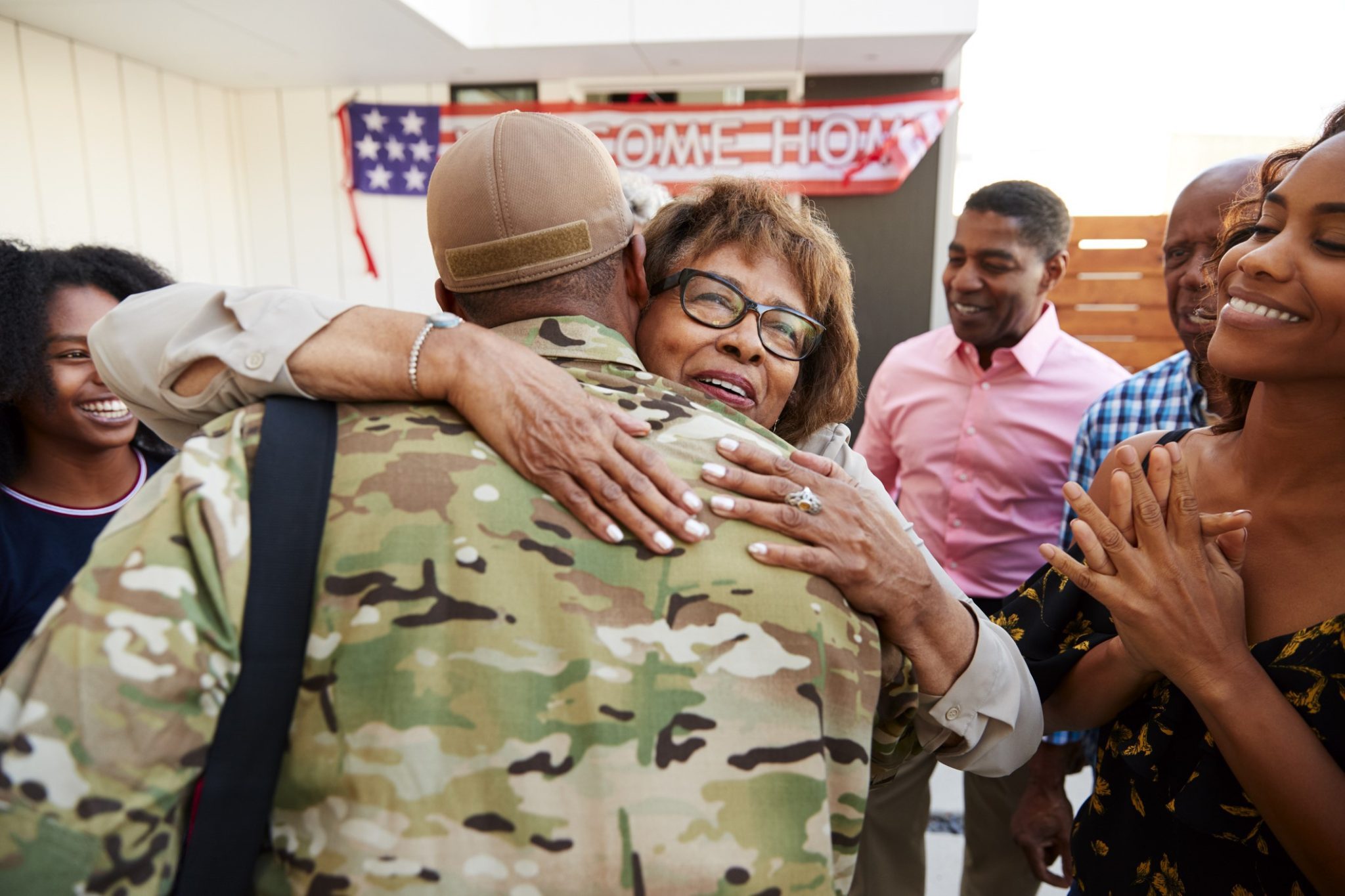By Jenny Rea, Ph.D.
Despite the unique challenges that service members face, positive family relationships can serve as a valuable resource in navigating the deployment process, especially for those with limited other support.
Studies (e.g., Crow et al., 2016; Gewirtz et al., 2010; Polusny et al., 2011) on the impact of deployment on military families have primarily focused on spouses and children rather than the parent-service member relationship. This is interesting since nearly half (47%) of the entire military force is single (not married) and without children.
The minimal research involving parents implies that they experience military life differently than romantic partners and children of service members. For example, parents are socialized to be protectors of their sons and daughters, a role not typically occupied by spouses or children (e.g., Crow et al., 2016).
Managing throughout the Deployment
While the roles of parents of service members may be different than other family members, it’s likely that parents will experience similar emotions as spouses and military children. They feel pride and confidence for their son or daughter serving in the military. However, they also feel the uncertainty of what to expect as their child considers joining the military and what their future might hold.
In addition, parents feel may have fears, worries, and concerns for the safety and well-being of their adult child. This is especially true when their adult child is deployed to a war zone. During deployment, parents may have feelings of desolation, loneliness, and depression as well (Crow et al., 2016).
Many parents have described feeling excluded from military support groups that catered to the needs of romantic partners and children of service members. Parents have also reported concerns about a lack of communication and the desire for more information about and from their adult child.
The Power of Parental Support
For many service members, their parents may be a major source of support, as they are engaged with and concerned about their adult child’s well-being.
Within the past 30 years, parents have become more involved in their adult children’s lives (Fingerman, Cheng, Tighe, Birditt, & Zarit, 2012). Relatedly, parental support and closeness have been linked to the mental health and well-being of their adult children (e.g., Boutelle, Eisenberg, Gregory, & Neumark-Sztainer, 2009).
A recent study found that when soldiers and parent(s) communicated more frequently throughout the deployment process, soldiers perceived a more positive relationship with their parent(s). The frequency of communication, in turn, positively impacted the soldier’s mental health (e.g., minimized PTSD symptoms) and well-being.
Strategies to Support the Parents of Service Members
It’s uncertain as to why this group of parents is often overlooked when it comes to understanding their experiences, and how they handle military life. In fact, parents of service members are frequently “left in the dark” when it comes to attaining information, and retrieving resources and support, especially in the wake of a deployment.
As a result, strategies and resources for service providers and extension educators have been provided below to help support the parents of our military service members.
Strategy #1 – Help strengthen the adult child-parent relationship by providing families with practical ways to engage in regular communication throughout the deployment process. For example, using Whatsapp to communicate or even sending snail mail (of course, the parent will need the correct mailing address for their service member!).
Strategy #2 – Connect parents of service members to “similar others” as other parents may provide them with relevant information. Similar others can also empathize because their circumstances resonate with their parents’ own experiences. One example might be to host a family event to which all members of the family (extended or not) are invited.
Strategy #3 – Encourage service members to foster positive relationships with their parents. In situations where there is a strained relationship between the service member and the parent, encourage them to repair these relationships, especially prior to deployment.
Strategy #4 – In situations where there is a positive relationship between the service member and the parent, encourage service members to turn to their parents for additional support, especially when preparing for deployment.
Strategy #5 – Seek opportunities to engage parents of service members in programming throughout the deployment process. Be sure to share privacy concerns (i.e., OPSEC; Operations Security) in sharing information about service members with their parents, especially through social media.
Strategy #6 – Help parents identify and use the resources (see below) that are available to them.
Resources
Military OneSource
Military REACH
- Being a parent of a U.S. service member: A challenging, yet rewarding job
- Does our relationship matter: Being a parent of a deployed service member
- You’re not alone: Parents of service members
Other
- A list of books is available through Operation We Are Here
- Can we get Military Parents’ Benefits?
- Military Family Support
- Support for Parents
- When kids grow up: How to support adult children without hovering
References
- Basinger, E. D., & Knobloch, L. K. (2018). A grounded theory of online coping by parents of military service members. Journal of Social and Personal Relationships, 35(5), 702-721. https://journals.sagepub.com/doi/10.1177/0265407517694769
- Crow, J. R., Myers, D. R., Ellor, J. W., Dolan, S. L., & Morissette, S. (2016). Military deployment of an adult child: Ambiguous loss and boundary ambiguity reflected in the experiences of parents of service members Marriage & Family Review, 52(5), 481-509. DOI: 10.1080/01494929.2015.1115454
- Farero, A. M., Blow, A., Bowles, R.,Gorman, L., Kees, M., & Guty, D. (2019). The relationship between parent–soldier communication and postdeployment soldier mental health. Military Behavioral Health, 7:3, 336-344, DOI: 10.1080/21635781.2018.1550026
- Fingerman, K. L., Cheng, Y., Tighe, L., Birditt, K. S., & Zarit, S. (2012). Relationships between young adults and their parents. In A. Booth, S. L. Brown, N. S. Landale, W. D. Manning, & S. M. McHale (Eds.), Early adulthood in a family context (pp. 59–85). New York: Springer. https://link.springer.com/chapter/10.1007/978-1-4614-1436-0_5
- Gewirtz, A. H., Polusny, M. A., DeGarmo, D. S., Khaylis, A., & Erbes, C. R. (2010). Posttraumatic stress symptoms among National Guard soldiers deployed to Iraq: Associations with parenting behaviors and couple adjustment. Journal of Consulting and Clinical Psychology, 78(5), 599–610. https://pubmed.ncbi.nlm.nih.gov/20873896/
- Polusny, M. A., Erbes, C. R., Murdoch, M., Arbisi, P. A., Thuras, P., & Rath, M. B. (2011). Prospective risk factors for new-onset post-traumatic stress disorder in National Guard soldiers deployed to Iraq. Psychological Medicine, 41(04), 687–698. https://pubmed.ncbi.nlm.nih.gov/21144108/
Writers Biography
 Jenny Rea, Ph.D., is a military spouse and mom of four kiddos under six years. Jenny consults with OneOp and is an Assistant Professor of Practice in the Department of Human Services and Director of the Certificate in Military Families at the University of Arizona.
Jenny Rea, Ph.D., is a military spouse and mom of four kiddos under six years. Jenny consults with OneOp and is an Assistant Professor of Practice in the Department of Human Services and Director of the Certificate in Military Families at the University of Arizona.
Photo source: IStock















